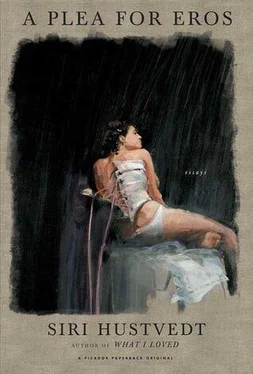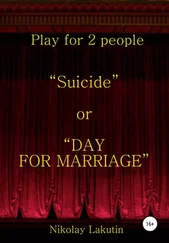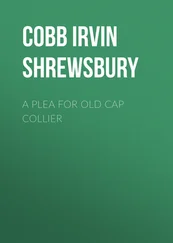Love affairs and marriages stand or fall on this secret. Familiarity and the pedestrian realities of everyday life are the enemies of eros. Emma Bovary watches her husband eat and is disgusted. She studies maps of Paris and hopes for something grander, more passionate, unfamiliar. A friend of mine told me about evenings out with her husband, during which they seduce each other all over again and she can’t wait to get home and jump on his beautiful body; but if on the way into the house he pauses to straighten the lids on the garbage cans, the spell is broken. She told him, and he now resists this urge. These interruptions disturb the stories we tell ourselves, the ready-made narratives that we have made our own. A combination of biology, personal history, and a cultural miasma of ideas creates attraction. The fantasy lover is always hovering above or behind or in front of the real lover, and you need both of them. The problem is that the alliance of these two is unpredictable. Eros, after all, was a mischievous little imp with arrows, a fellow of surprises who delighted in striking those who expected it least. Like his fairy reincarnation, Puck in A Midsummer Night’s Dream, he turns the world upside down. Hermia prefers Lysander to Demetrius for no good reason. Shakespeare’s young men Demetrius and Lysander, as has often been pointed out, are as alike and interchangeable as two pears. When Theseus points out to Hermia that Demetrius is just as good as Lysander, he isn’t lying. It’s just that Demetrius is not the one she likes. After much confusion and silliness, the lovers are set right by magic. Demetrius is never disenchanted. The flower juice remains in his eyes and he marries Helena under its influence, the point being that when we fall in love we’ve all got fairy juice in our eyes, and not one of us gives a jot about the sane advice of parents or friends or governments. And that’s why legislating desire is unwieldy. A child rushes over and kisses another child in a New York City school, and he’s nabbed by the authorities for “sexual harassment.” Maybe it was an aggressive act, a sudden lack of control that needed the teacher’s attention. Maybe the kissed child was unhappy or scared. And maybe, contrary to the myth of childish innocence, it was sexual, a burst of strange, wild feeling. I don’t know. But people, children and adults, do bump up against each other. Everywhere, all the time, there are scuffles of desire. We have laws against molestation and rape. Using power and position to extract sexual favors from an unwilling employee is ugly and shouldn’t be legal. But on the other side of these crimes is a blurry terrain, a borderland of dreams and wishes. And it isn’t a landscape of sunshine only. It is a place streaked with the clouds of sadism and masochism, where peculiar objects and garments are strewn here and there, and where its inhabitants weep as often as they sigh with pleasure. And it is nothing less than amazing that we should have to be reminded of this. All around us, popular singers are crooning out their passion and bitterness on the radio. Billboards, advertisements, and television shows are playing to our erotic weaknesses twenty-four hours a day. But at the same time, there is a kind of spotty cultural amnesia in particular circles, a blockheaded impulse to crush complexity and truth in the name of right-thinking.
Once when I was attending a panel discussion on the fate or the state of “the novel” at the 92nd Street Y, because my husband had been roped into moderating this discussion, I listened to a novelist, an intelligent and good writer, berate Kafka for his depictions of women. They were bad, she said, wrongheaded. But in Kafka’s world of dreams and claustrophobia, a world of irreducible images so powerful that they shake me every time I remember them, what does it mean to second-guess its genius, to edit out the women who lift their skirts for the wandering K.? When I read Kafka, I am not that housemaid who presents herself to the tormented hero anyway. I am the hero, the one who takes the pleasure offered, as we all do when we sleep.
This is my call for eros, a plea that we not forget ambiguity and mystery, that in matters of the heart we acknowledge an abiding uncertainty. I honestly think that when we are possessed by erotic magic we don’t feel like censoring Kafka or much else, because we are living a story of exciting thresholds and irrational feeling. We are living in a secret place we make between us, a place where the real and unreal commingle. That’s where the young philosopher took the woman with the belligerent question. He brought her into a realm of the imagination and of memory, where lovers are alone speaking to each other, saying yes or no or “perhaps tomorrow,” where they play at who they are, inventing and reinventing themselves as subjects and objects; and when the woman with the question found herself there, she was silent. Maybe, just maybe, she was remembering a passionate story of her own.
1996
I FIRST READ THE GREAT GATSBY WHEN I WAS SIXTEEN YEARS old, a high school student in Northfield, Minnesota. I read it again when I was twenty-three and living in New York City, and now again at the advanced age of forty-two. I have carried the book’s magic around with me ever since that first reading, and its memory is distinct in my mind, because unlike many books that return to me chiefly as a series of images, The Great Gatsby has also left its trace in ray ear — as enchanted music, whispering, laughter, and as the voice of storytelling itself.
The book begins with the narrator’s memory of something his father told him years before: “Whenever you feel like criticizing anyone, remember that all the people in this world haven’t had the advantages that you’ve had.” As an adage for life, the quotation is anticlimactic — restrained words I imagine being uttered by a restrained man, perhaps over the top of his newspaper, and yet without this watered-down American version of noblesse oblige, there could be no story of Gatsby. The father’s words are the story’s seed, its origin. The man who we come to know as Nick Carraway tells us that his father “meant a great deal more” than what the words denote, and I believe him. Hidden in the comment is a way of living and an entire moral world. Its resonance is double: first, we know that the narrator’s words are bound to his father’s words, that he comes from somewhere he can identify, and that he has not severed that connection; and second, we know that these paternal words have shaped him into who he is, a man “inclined to reserve all judgements”—in short, the ideal narrator, a man who doesn’t leap into the action but stays on the sidelines. Nick is not an actor but a voyeur, and in every art, including the art of fiction, there’s always somebody watching.
Taking little more than his father’s advice, the young man goes east. The American story has changed direction: the frontier is flip-flopped from west to east, but the urge to leave home and seek your fortune is as old as fairy tales. Fitzgerald’s Middle West was not the same as mine. I did not come from the stolid advantages of Summit Avenue in St. Paul. I remember those large, beautiful houses on that street as beacons of wealth and privilege to which I had no access. I grew up in the open spaces of southern Minnesota in one of the “lost Swede towns” Fitzgerald mentions late in the book, only we were mostly Norwegians, not Swedes. It was to my hometown that Fitzgerald sent Gatsby to college for two weeks. The unnamed town is Northfield. The named college is St. Olaf, where my father taught for thirty years and where I was a student for four. Gatsby’s ghost may have haunted me, because even in high school I knew that promise lay in the East, particularly in New York City, and ever so vaguely, I began to dream of what I had never seen and where I had never been.
Читать дальше












